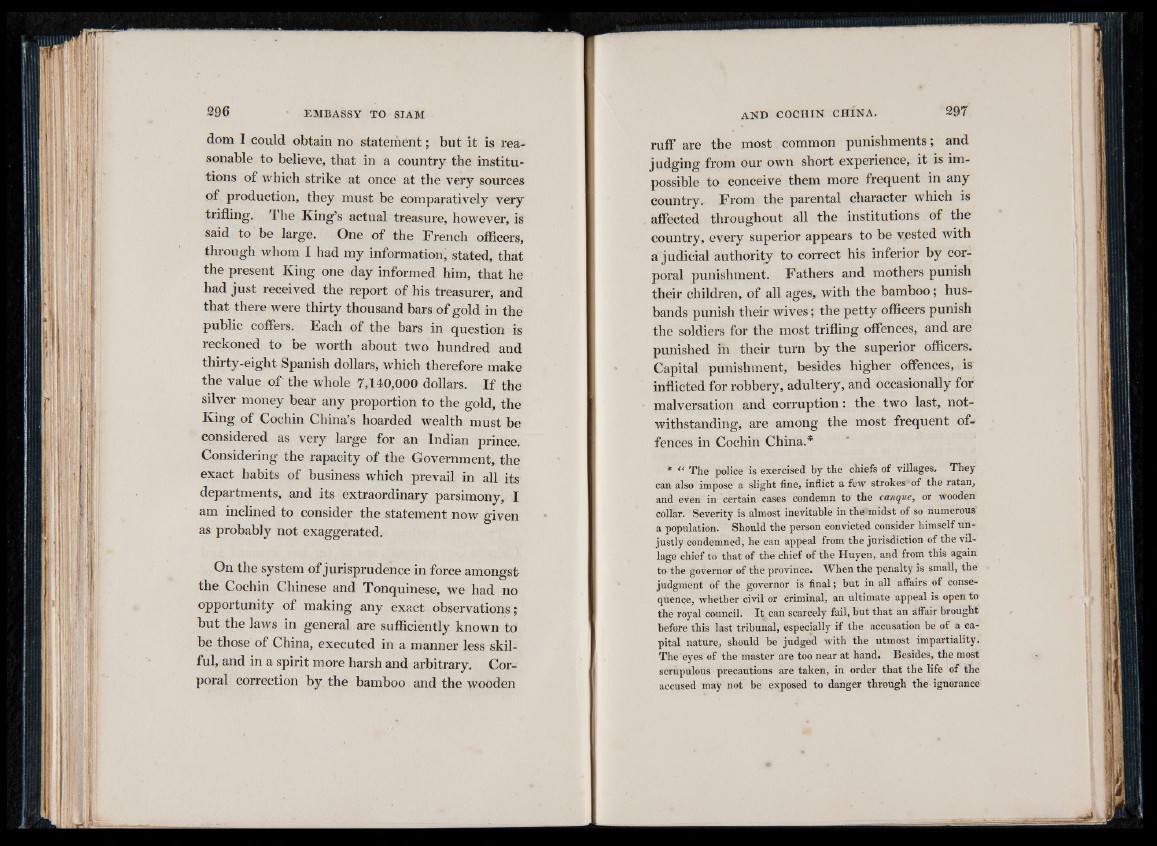
dom I could obtain no statement; but it is reasonable
to believe, that in a country the institutions
of which strike at once at the very sources
of production, they must be comparatively very
trifling. The King’s actual treasure, however, is
said to be large. One of the French officers,
through whom I had my information, stated, that
the present King one day informed him, that he
had just received the report of his treasurer, and
that there were thirty thousand bars of gold in the
public coffers. Each of the bars in question is
reckoned to be worth about two hundred and
thirty-eight Spanish dollars, which therefore make
the value of the whole 7,140,000 dollars. I f the
silver money bear any proportion to the gold, the
King of Cochin China’s hoarded wealth must be
considered as very large for an Indian prince.
Considering the rapacity of the Government, the
exact habits of business which prevail in all its
departments, and its extraordinary parsimony, I
am inclined to consider the statement now given
as probably not exaggerated.
On the system of jurisprudence in force amongst
the Cochin Chinese and Tonquinese, we had no
opportunity of making any exact observations;
b u t the laws in general are sufficiently known to
be those of China, executed in a manner less skilful,
and in a spirit more harsh and arbitrary. Corporal
correction by the bamboo and the wooden
ruff are the most common punishments ; and
judging from our own short experience, it is impossible
to conceive them more frequent in any
country. From the parental character which is
affected throughout all the institutions of the
country, every superior appears to be vested with
a judicial authority to correct his inferior by corporal
punishment. Fathers and mothers punish
their children, of all ages, with the bamboo; husbands
punish their wives; the petty officers punish
the soldiers for the most trifling offences, and are
punished in their turn by the superior officers.
Capital punishment, besides higher offences, is
inflicted for robbery, adultery, and occasionally for
malversation and corruption: the two last, notwithstanding,
are among the most frequent offences
in Cochin China.*
* “ The police is exercised by the chiefs of villages. They
can also impose a slight fine, inflict a few strokes of the ratan,
and even in certain cases condemn to the canque, or wooden
collar. Severity is almost inevitable in the midst of so numerous
a population. Should the person convicted consider himself unjustly
condemned, he can appeal from the jurisdiction of the village
chief to that of the chief of the Huyen, and from this again
to the governor of the province. When the penalty is small, the
judgment of the governor is final; but in all affairs of conse-
quenqe, whether civil or criminal, an ultimate appeal is open to
the royal council. It can scarcely fail, but that an affair brought
before this last tribunal, especially if the accusation be of a capital
nature, should be judged with the utmost impartiality.
The eyes of the master are too near at hand. Besides, the most
scrupulous precautions are taken, in order that the life of the
accused may not be exposed to danger through the ignorance